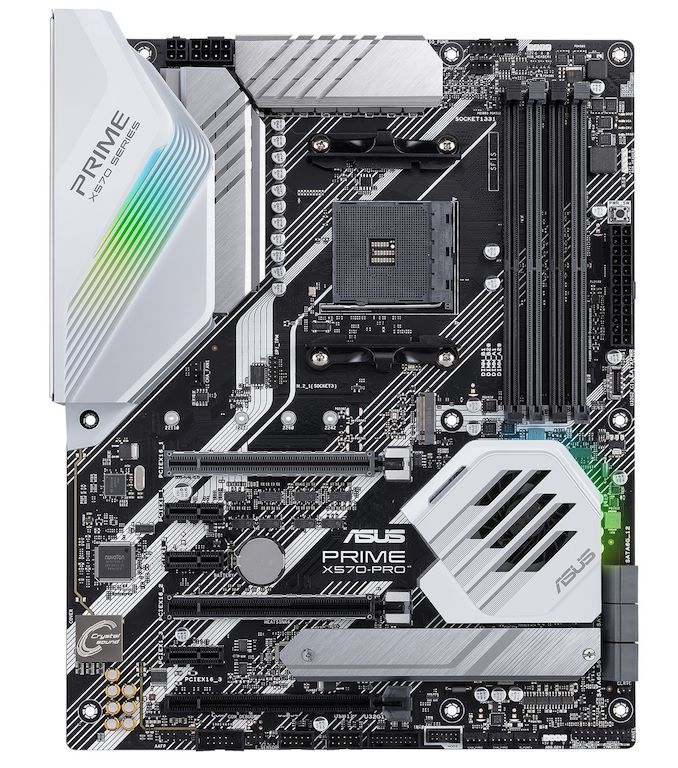The AMD X570 Motherboard Overview: Over 35+ Motherboards Analyzed
by Gavin Bonshor on July 9, 2019 8:00 AM ESTASUS Prime X570-Pro
Moving onto the ASUS Prime series of X570 motherboards, the ASUS Prime X570-Pro represents the more feature-laden of two ATX sized models; the other being the ASUS Prime X570-P. The ASUS Prime X570-Pro represents its less aggressive and non-gaming Prime range with a more subtle white and black aesthetic. The most notable aspects of the feature set include a Realtek S1220A HD audio codec, Gigabit NIC, and support for up to 128 GB of DDR4 memory.
The ASUS Prime X570-Pro offers three full-length PCIe 4.0 slots which run at x16, x8/x8, and x8/x8/x4. This allows for users to use two-way NVIDIA SLI and up to three-way AMD Crossfire multi-graphics card setups. Also present is three PCIe 4.0 x1 slots, with the board's storage capabilities coming through two PCIe 4.0 x4 M.2 slots, with the bottom slot coming with a heatsink; there are also six SATA ports with support for RAID 0, 1 and 10 arrays. In the top right-hand corner is four memory slots with support for up to 128 GB which allows users to install the 32 GB UDIMMs that has started making its way onto the market.
On the rear panel, the ASUS Prime X570-Pro includes three USB 3.1 G2 Type-A, one USB 3.1 G2 Type-C, and four USB 3.1 G1 Type-A ports. Adopters of AMD's impending Ryzen 3000 APUs and the Ryzen 2400/2200G will appreciate the HDMI and DisplayPort video outputs. There is also a PS/2 keyboard and mouse combo port, an Intel I211-AT Gigabit powered Ethernet port, and five 3.5 mm audio jacks and S/PDIF optical output driven by a Realtek S1220A HD audio codec.
The ASUS Prime X570-Pro has an MSRP of $250 and is more suited to users looking to avoid the swathe of gaming-themed models on the market. What the Prime series offers is elegant and neutral designs, which would actually look quite good with some RGB to make the white rear panel cover pop. There's support for two-way NVIDIA SLI and three-way AMD CrossFire too so users looking to build a more subtly styled gaming system can do so.












225 Comments
View All Comments
isthisavailable - Wednesday, July 10, 2019 - link
The industry needs to make up its mind when it comes to USB C. Laptops are launching with only USB C and meanwhile $700 motherboards only have 1 USB C port and 8+ "outdated" USB A'sThe_Assimilator - Wednesday, July 10, 2019 - link
It's almost like there's a huge amount of peripherals with USB-A connectors that people who use PCs expect to continue to work when they upgrade! Isn't backwards compatibility a funny feature?Meanwhile, the only peripherals that laptops generally use are docks, hubs, and storage devices - all of which have USB-C versions out the wazoo.
naris - Wednesday, July 10, 2019 - link
Why are memory speeds and channels show & discussed when talking about chipsets when the memory controllers are in the CPUs? Memory controllers have not been in chipsets for many years now!halfflat - Wednesday, July 10, 2019 - link
ECC support can be hard to verify for mere mortals; collating (or even better, verifiying) ECC capability on these motherboards would be an extremely useful addition to the article.ishkatar - Wednesday, July 10, 2019 - link
Does any of the boards support Raid 5? I only see 0, 1 and 10.Zibi - Wednesday, July 10, 2019 - link
You don't want to use RAID 5 without proper RAID Controller with cache.That means dedicated card.
Actually from performance / security perspective RAID 10 is pretty OK.
The_Assimilator - Wednesday, July 10, 2019 - link
AMD dropped RAID-5 support upon introduction of the AM4 socket (remember, chipset functionality like RAID is now a CPU function). I don't have an issue with that, since -5 is a very uncommon use-case in consumer workloads and if you want to do -5 right, you really want a hardware RAID card with a BBU.But -5 is pretty much dead anyway due to ever-increasing drive sizes - the rebuild time on anything over 1TB is horrendous, what you really want in such a scenario is RAID-6, and no consumer motherboard every has or will support that.
And please don't tell me you're using RAID-5 for data integrity, because invisible corruption is a thing that I have experienced personally. If you want *actual* data integrity, use Windows Storage Spaces or RAID-10, and as a last resort RAID-6.
Arbie - Wednesday, July 10, 2019 - link
There must be something you left out of this roundup. Whatever it was, please go back and put it in, and next time get it right. Thanks.Korguz - Wednesday, July 10, 2019 - link
huh ????Gastec - Wednesday, July 10, 2019 - link
That $700 must be an error right, perhaps of judgement?